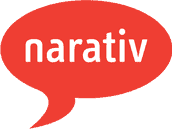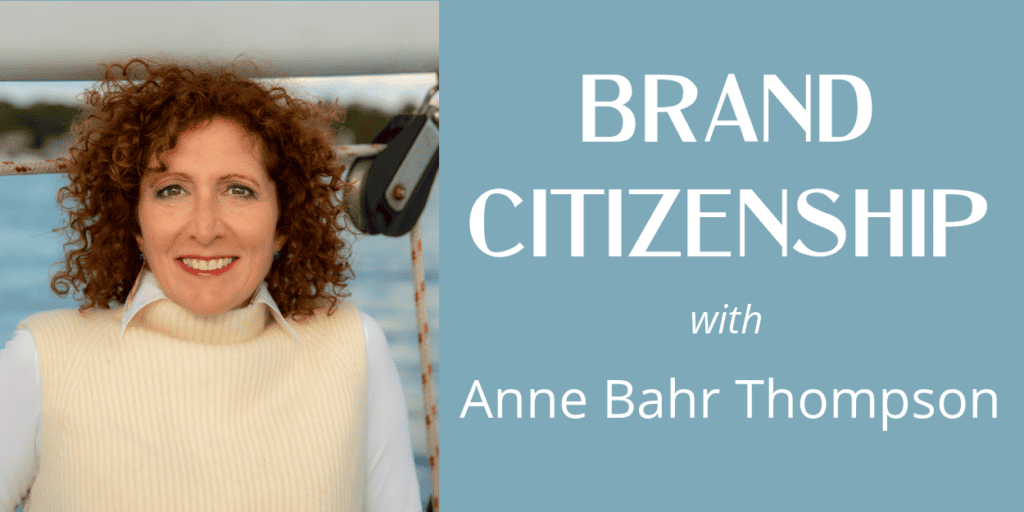In a recent episode of Narativ’s Leadership Story Talks podcast, Jerome and Julienne spoke with Anne Bahr Thompson, an early pioneer of the Purpose Space, a Superbrands branding leader, a Trust Across America thought leader, and a GCPIT global woman in leadership. Anne is the author of the book Do Good: Brand Citizenship to Fuel Both Purpose and Profit, which details her pioneering “me-to-we” continuum of brand citizenship, and she is focused on shifting the consciousness of business.
During their discussion, Anne, Jerome, and Julienne touched on the meaning of brand citizenship and the consciousness of business that Anne has spent so much of her life working to shape. They also touched on some of the reasons that evolving consciousness can be so difficult, as well as what needs to be done so business and society can evolve together as a team to become better on all fronts.
Anne’s Story: Fixing Fragmented Values
Anne describes the journey that brought her to where she is now as “a journey of fits and starts.” Directly out of business school, her first job was in cash management and the middle market. This was followed by a move into the asset management department of a major bank (a career beginning she and Jerome have in common). It was at the bank that Anne first began noticing wide inconsistencies in how different divisions were representing themselves. In some instances, the different divisions were using such vastly different visuals, language, and tactics that they seemed like entirely different organizations.
This led her pivot away from the banking world and into brand consulting at Interbrand, a position that ultimately inspired her to venture into independent consulting to help businesses overcome these internal inconsistencies and develop a more unified brand. However, along the way, Anne became frustrated by how frequently she saw organizations that were not aligned with their stated values. She could see how this misalignment was not only hurting the businesses themselves but also hurting society as a whole, and she became determined to use her influence to guide businesses to embrace a more community-oriented model.
What is Brand Citizenship?
Brand citizenship is an approach to business built around the idea that businesses should be active participants in society, rather than sitting apart from it. Simply put, a business entity should act as a citizen of the society it exists within. As a citizen, it should take on its share of responsibility for contributing to the improvement of that society.
Based on extensive research Anne has spearheaded, there are five steps required for a business to become a model citizen:
- Trust
- Enrichment
- Responsibility
- Community
- Contribution
During the interview, Anne only briefly touched on these steps, but she went on to share that they can be developed through what she calls “consciousness of business.”
How Does a Business Become Conscious?
One of the most important things a business can do to become a better citizen is to make a shift from being shareholder-oriented to being stakeholder-oriented. The difference may appear subtle, but a lot changes when a business prioritizes the people it directly affects (namely employees, customers, investors, and suppliers) rather than only the ones who simply own shares of the company’s stock.
This shift does not even necessarily need to be altruistic, according to Anne. A business can be fully motivated by a desire to increase profit and productivity, and as long as they are trying to achieve those ends by improving conditions for their employees and community, the results are the same. Anne explained that often this fact is lost in the moralizing over motivation that our society so often participates in. Because of this many businesses will often choose to save face by looking like they have the “right” motivations rather than doing actual good. Anne is firm that the motivation should not be our focus.
“What difference does it make if a business is doing something to gain benefit if it is actually helping?” she asked before going on to explain that if a business is doing genuine good, no matter the motivation, that will eventually serve to shift their values to align with their actions.
“If you dress the part, you eventually become the part.”
A Fair Share of Responsibility
Over the course of the interview, Anne and the hosts dug into some pretty deep philosophy on many things, including the nature of resources and responsibility. Anne feels it is important for everyone—not just businesses—to understand their personal responsibility in using their resources to shape the common good. It is up to every person to determine what they should be doing to improve their community and society, and then to change their behavior when they are doing things to hurt rather than help.
When applied to business, this means that because a business is trusted with a much larger share of societal resources than an individual person usually is, then companies also have a greater share of responsibility in contributing to the public good.
The philosophy of this is far more complex than one podcast interview is able to cover, but it is something Anne tries to help her clients understand in her consulting work.
An Evolving Consciousness
The interview continued on its philosophical path as Anne, Jerome, and Julienne discussed the broader scope of business consciousness and the way society needs to evolve to support it. Building on the statements of other thought leaders, Anne emphasized that business theory and social theory are too often considered separately when, in reality, they are truly one and the same.
It is integral that every member of a society thinks of the other members as part of their “team,” and when a business is acting as a member of society that business should be considered a member of the team—and align its values with that idea.
Anne’s focus is on guiding businesses to change and become better, but she says for this to truly work, society also needs to become better. It goes both ways, and one can’t improve without the other. And it’s important we all play our part in supporting positive change.
Citizens of a Better World
A central idea that surfaced throughout the episode was that action is far more important than wording when it comes to doing good. We often tend to get hung up on applying the right value-centered wording to our branding to convey the right message, but what truly speaks is whether our actions reflect our core values. The same can be said for both individuals and businesses.
As we continue to focus on doing good rather than just saying the right thing, we will see a drastic change in not only our alignment with our stated values but also in our values themselves—which then serves to build better businesses and a better society.
If you’d like to hear the discussion in its entirety, you can listen to the episode here. To learn more about Anne and her work, visit her website. To learn how to better align your personal and company values through storytelling, visit us here.




